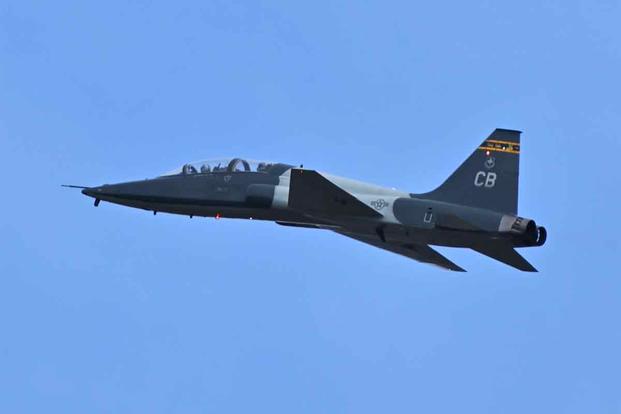An Air Force pilot's landing gear failed at Columbus Air Force Base in Mississippi on Friday, forcing the airman to skid the belly of the T-38C Talon training jet across the runway to land safely.
"A T-38C from Columbus AFB experienced an in-flight emergency at approximately 10:45 a.m.," a news release from Columbus Air Force Base said. "The T-38C suffered a malfunction of the landing gear system and was forced to execute a gear-up landing."
The pilot was not injured, a base spokeswoman told Military.com, and the cause of the incident is under investigation.
Read Next: Crew That Delivered Baby Mid-Flight from Afghanistan Will Receive Distinguished Flying Cross
The T-38C's in-flight emergency marks the second incident with a training jet from Columbus Air Force Base this month, and some experts say it underscores the long-standing worries officials have with the age of the aircraft.
Earlier this month, on Nov. 7, an instructor pilot had to eject from his jet when it was "rendered inoperable and unrecoverable upon initial takeoff," Col. Jeremy Bergin, Columbus Air Force Base vice wing commander, told reporters.
In that incident, two T-38Cs took off, each with one person, an instructor, aboard. They were flying in a formation when one of the jets experienced the malfunction.
The jet crashed at a private property about 30 minutes south of the base. The instructor was taken to a nearby hospital and there were no fatalities, according to a press release.
There have been other crashes involving the T-38 in recent years, too.
Last year, on Feb. 19, two pilots in a T-38 from the base died during a training mission outside of Montgomery, Alabama, as the jet was making its way to Florida.
Killed in the crash was Scot Ames Jr., an instructor pilot with the 50th Flying Training Squadron, as well as Renshi Uesaki, a student pilot who was a member of the Japanese Air Self Defense Force.
In May 2018, two pilots ejected from their T-38 near Columbus AFB, and the plane crashed in a remote part of northeast Mississippi. In August the same year, the base halted flight operations for 24 hours after a T-38 ejection seat inadvertently fired while the plane was undergoing inspection.
The Air Force has been flying the T-38 since the 1960s. The two-seat, supersonic jet trainer is used by the service, as well as the Navy and NASA, as part of pilot training.
Since the Talon went into service, the Air Force has reported 211 Class A mishaps -- the term used by the military to describe the deadliest or costliest crashes, according to Air Force Safety Center data. There have been a total of 86 pilot deaths and 149 fatalities from the T-38 in its 62-year history.
Jeremiah Gertler, a senior associate with the Center for Strategic and International Studies think tank in Washington, D.C., who specializes in aviation, told Military.com that, while it's not clear that the two incidents with the T-38Cs this month are connected, it is well known that aging aircraft are more prone to issues.
"Things wear out," Gertler told Military.com. "Whether the accidents are related or not, they do have age in common. ... There have been incidents throughout its life."
The service has been planning for several years to phase out the T-38.
In September 2018, the service gave Boeing Co. a $9.2 billion contract to build a replacement aircraft, with a working name of T-X. In 2019, the Air Force rebranded the T-X as the T-7A Red Hawk, named in honor of the Tuskegee Airmen.
The first T-7A is expected to be delivered sometime in 2023, along with new flight training simulators. And while the new training jet is expected to be superior to the T-38, experts say it won't be arriving any quicker as incidents continue to occur.
"We can't get the T-7 faster; they're still in development," Gertler said. "If for some reason they grounded all the T-38s tomorrow, it still wouldn't get the T-7 here any sooner."
-- Thomas Novelly can be reached at thomas.novelly@military.com. Follow him on Twitter @TomNovelly.
Related: Air Force Training Jet Crashes in Mississippi After Becoming 'Inoperable' Shortly After Takeoff













